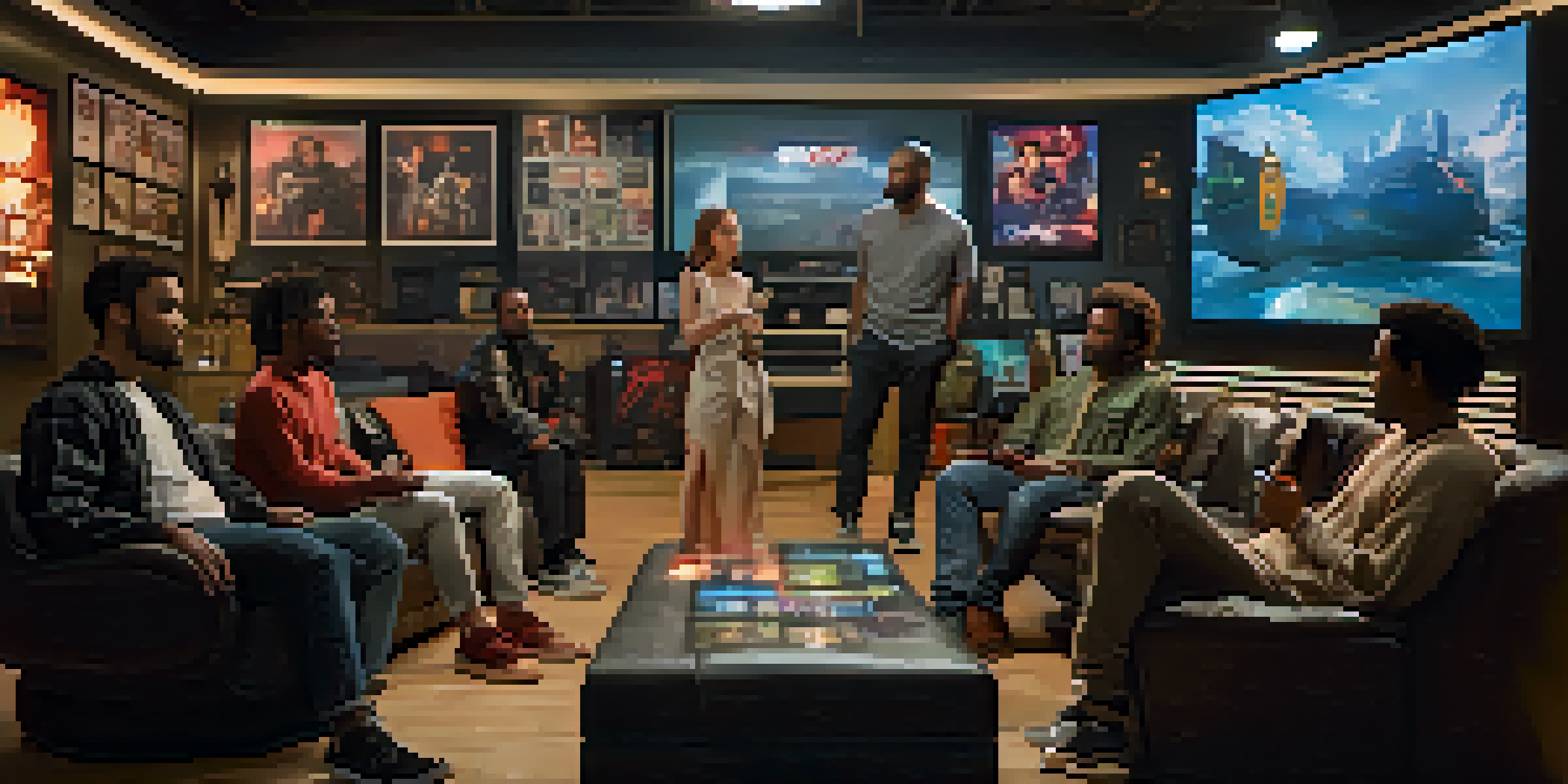The Business of Adaptations: Video Games to Movies

The Rise of Video Game Adaptations in Film
In recent years, there has been a significant surge in video game adaptations being made into films. This trend reflects the growing popularity of video games as a cultural phenomenon and their expansive fan bases. Studios recognize that these adaptations can tap into existing audiences, making them a potentially lucrative investment.
Video games are a new form of storytelling that can capture emotions in a way that traditional media cannot.
Movies like 'Detective Pikachu' and 'The Sonic the Hedgehog' have achieved both critical and commercial success, paving the way for more adaptations. This success showcases that video game narratives can translate well onto the big screen when done right. However, the journey from console to cinema is often fraught with challenges.
Despite the potential for success, not all adaptations hit the mark. Many adaptations have faced criticism for straying too far from the source material or failing to capture the essence of the games. This highlights the importance of understanding both the gaming medium and cinematic storytelling.
Understanding the Source Material
One of the key challenges in adapting video games is understanding the source material. Each game comes with its own unique lore, characters, and gameplay mechanics that contribute to its appeal. A successful adaptation must respect these elements while also translating them in a way that fits the film format.

For instance, 'The Witcher' series on Netflix found success by staying true to both the game and the original books, striking a balance that resonated with fans. This level of detail and respect for the source material can help build credibility and foster goodwill among the audience. Conversely, neglecting these details can lead to backlash from dedicated fans.
Importance of Source Material
Understanding and respecting the unique lore and characters of video games is crucial for successful film adaptations.
Moreover, the interactive nature of video games poses a challenge. Unlike films, games engage players in a way that allows them to shape their own experiences, making it difficult to convey that same level of engagement in a linear film narrative. Understanding this difference is crucial for any adaptation to succeed.
The Importance of Storytelling in Adaptations
At the heart of every great film is a compelling story, and this is no different for video game adaptations. A strong narrative can elevate an adaptation from a mere cash grab to a thoughtful interpretation of beloved characters and plots. Screenwriters must find ways to distill complex stories into a format that engages viewers within a typical two-hour runtime.
Adapting a beloved game into a movie is like trying to capture lightning in a bottle; it requires care, respect, and a deep understanding of the source material.
For example, 'Tomb Raider' successfully reimagined the origin story of Lara Croft, giving depth to her character while also delivering the action fans expect. This blend of storytelling and action can create a more enjoyable experience for both fans of the game and newcomers. The challenge lies in striking the right balance between staying true to the game and creating a standalone film.
Ultimately, the storytelling approach can make or break an adaptation. If viewers can connect with the characters and their journeys, they are more likely to embrace the film and its creative direction. This connection is crucial for any adaptation hoping to achieve both commercial success and critical acclaim.
Casting: Finding the Right Actors
Casting is a pivotal element in the success of any film, and video game adaptations are no exception. The right actors can bring iconic characters to life, enhancing the emotional depth and relatability of the story. However, casting decisions can be contentious, especially when fans have strong opinions about who should play their favorite characters.
Take the casting of Tom Holland as Nathan Drake in 'Uncharted'—while it sparked debate among fans, many were ultimately won over by his performance. The key to successful casting lies in finding actors who can embody the essence of their characters while also appealing to a broader audience. This requires a delicate balance of star power and authenticity.
Storytelling is Key
A compelling narrative can elevate video game adaptations, making them engaging for both fans and new audiences.
Moreover, diverse casting choices can also enrich the story and make it more relatable to a wider range of viewers. By embracing diversity in casting, filmmakers can create adaptations that resonate more deeply with global audiences, reflecting the diverse fanbases of the games themselves.
Budgeting and Production Challenges
Creating a video game adaptation often comes with unique budgeting and production challenges. High-quality visuals, special effects, and action sequences that fans expect can drive costs up significantly. This necessitates careful planning and allocation of resources to ensure that the film meets audience expectations without compromising on quality.
Additionally, securing the rights to adapt a video game can also be a complex and costly endeavor. Negotiating contracts and dealing with multiple stakeholders can delay production and increase expenses. This complexity adds another layer of difficulty, as studios must navigate legalities while trying to stay within budget constraints.
Ultimately, balancing financial considerations with creative aspirations is crucial for any adaptation's success. A well-funded production can lead to stunning visuals and a captivating experience, but poor management can result in a film that disappoints both financially and critically.
The Role of Fan Expectations
Fan expectations play a significant role in the business of video game adaptations. Fans often have deep emotional connections to the games and their characters, which can create high expectations for how these elements are portrayed on screen. Meeting these expectations can be challenging, especially when adapting beloved franchises.
For instance, the backlash against the 'Resident Evil' movie series stemmed from deviations from the source material, which left many fans feeling alienated. This highlights the importance of listening to fan feedback while also remaining true to the creative vision of the filmmakers. A balance must be struck to satisfy both hardcore fans and general audiences.
Fan Expectations Matter
Balancing fan expectations with creative vision is essential for adaptations to resonate and gain support from viewers.
Moreover, engaging with fans through social media and marketing strategies can help build anticipation and understanding of the adaptation process. When fans feel heard and included, they are more likely to support the film, even if certain decisions deviate from their expectations.
Future Trends in Video Game Adaptations
As the landscape of entertainment evolves, so too does the approach to video game adaptations. With the rise of streaming platforms, we are beginning to see a shift towards longer-form storytelling that allows for deeper exploration of characters and narratives. This could lead to more successful adaptations that resonate with both gamers and non-gamers alike.
Moreover, the integration of technology and virtual reality could open new avenues for adaptations, allowing fans to experience beloved stories in immersive ways. This potential for innovation may redefine how adaptations are created and consumed, offering exciting possibilities for the future.

As filmmakers continue to experiment with different formats and storytelling methods, the future of video game adaptations looks promising. By embracing creativity and tapping into the vast well of gaming stories, filmmakers can craft adaptations that honor the original works while reaching new heights in cinematic storytelling.